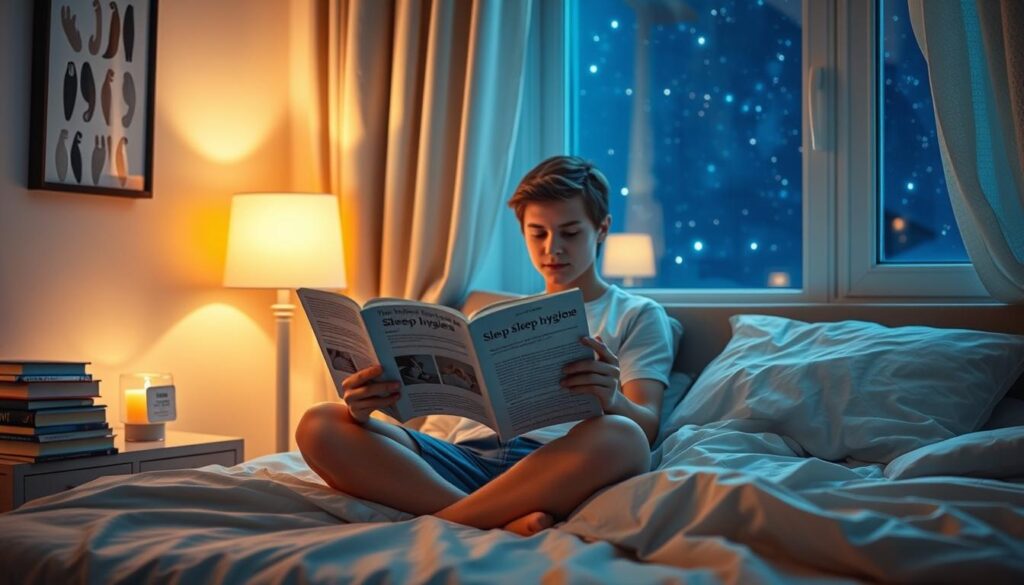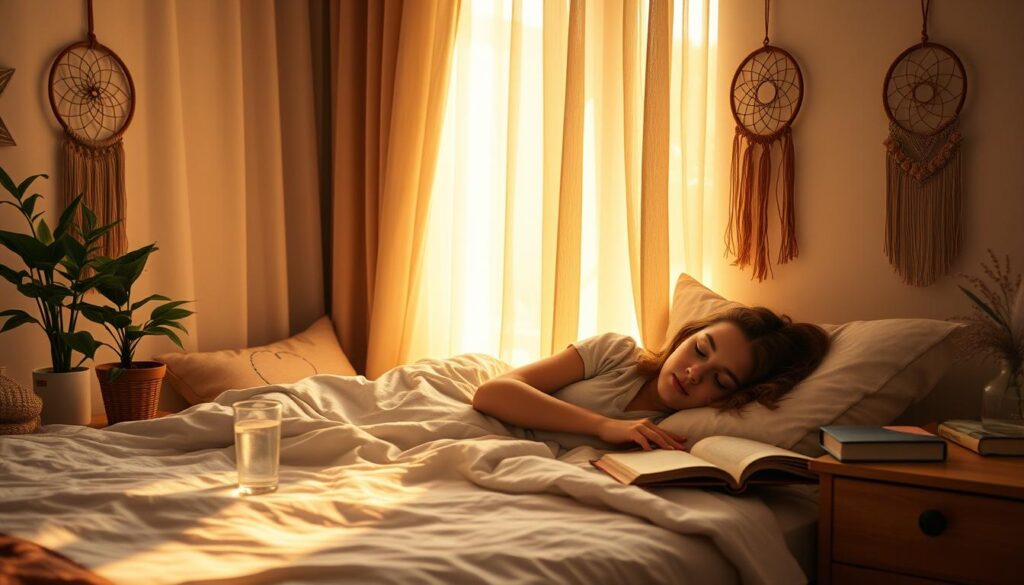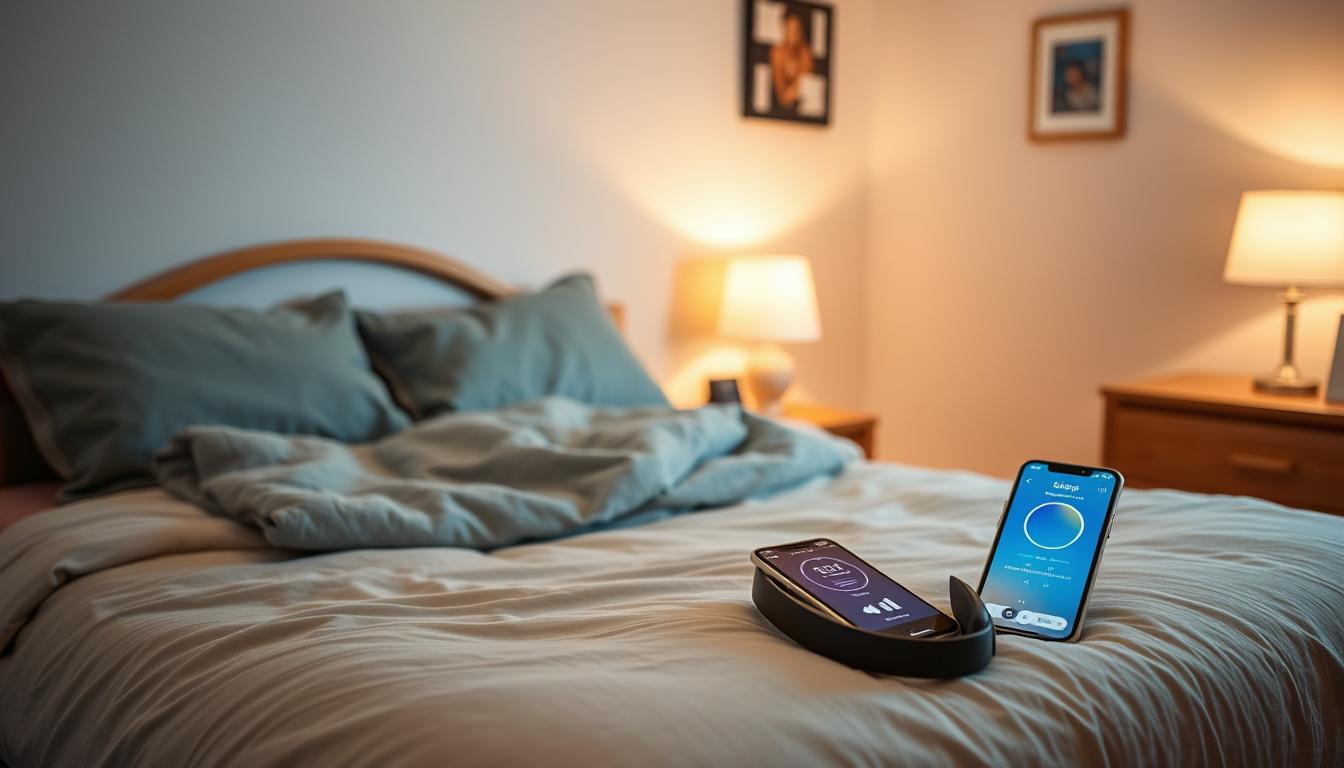Teens today face unique challenges when it comes to getting enough rest. Homework, screens, and busy schedules often disrupt their sleep. This guide helps parents and teens find the best sleep aids for teenagers to improve nighttime routines and overall health.
Quality sleep is vital for growth, learning, and emotional well-being. Yet many adolescents struggle with staying asleep or falling asleep. This resource explores safe and effective solutions, backed by science and practical advice.
From natural remedies to sleep hygiene tips, this guide covers everything needed to choose the right sleep aids for teenagers. It addresses common problems like insomnia, circadian rhythm shifts, and the impact of technology.
Key Takeaways
- Quality sleep boosts academic performance and mental health in teens.
- Best sleep aids for teenagers include both products and lifestyle changes.
- Safety is key when selecting supplements or over-the-counter options.
- Consistent routines and screen-free habits improve sleep quality.
- Professional guidance is available for persistent sleep struggles.
Explore this guide to discover how to support better sleep and create healthier habits for teenagers.
Understanding Teen Sleep Patterns
Teens need 8–10 hours of sleep nightly, but many fall short. Understanding teenage sleep patterns helps parents and teens tackle challenges early. Hormonal shifts and lifestyle choices often disrupt natural rhythms, leading to unique struggles.
Common Sleep Issues in Adolescents
Many teens face these struggles:
- Irregular bedtimes due to homework, screens, or social activities.
- Delayed sleep phase syndrome (DSPS), causing later bedtimes and mornings.
- Exposure to blue light from phones or tablets, suppressing melatonin.
Impact of Poor Sleep on Teen Health
Poor sleep harms more than just energy levels. Effects include:
| Area | Impact |
|---|---|
| Physical Health | Weakened immunity, weight changes, and growth delays. |
| Cognitive Function | Difficulty concentrating, poor memory retention. |
| Emotional Well-being | Increased anxiety, mood swings, and irritability. |
Paying attention to teenage sleep patterns helps spot problems early. Small changes in routines can improve health and daily performance.
The Science Behind Sleep and Adolescence
Teen sleep habits aren’t just about laziness—they’re rooted in biology. During adolescence, the brain undergoes rapid changes that directly impact rest. Let’s break down the science:
- Circadian rhythms shift. Teens’ internal clocks naturally delay, making them feel alert later at night. This “phase delay” clashes with early school times, causing sleep debt.
- Hormones play a role. Melatonin, the sleep hormone, releases later in teens compared to adults. This delay makes falling asleep before 11 p.m. harder.
- Brain development matters. The prefrontal cortex, responsible for planning and impulse control, matures slowly. This affects bedtime routines and stress management.
Research shows these changes aren’t temporary quirks. A 2020 study in Journal of Adolescent Health found that 73% of teens struggle with sleep due to these biological shifts. Schools and parents often misunderstand this, expecting early wake-up times that conflict with natural cycles.
Understanding these factors helps address sleep struggles thoughtfully. Upcoming sections explore practical solutions, but knowing the science behind the struggle is the first step toward better support.
Best Sleep Aids for Teenagers
Choosing the right sleep aid can make a big difference for teens struggling to sleep. But with so many options available, how do you know what works and what’s safe? This section breaks down key factors to consider when selecting products.
Evaluating Effectiveness
Effectiveness depends on evidence and results. Look for products backed by clinical studies or third-party certifications. For example, melatonin supplements with verified purity often show better results. Check reviews from other teens and parents to see real-world outcomes. Ask doctors or sleep specialists for recommendations—they might suggest options like weighted blankets or sound machines proven to calm restless minds.
Safety Considerations for Teens
“Always start with the smallest dose and monitor reactions closely,” advises Dr. Sarah Lee, a sleep specialist at the National Institute of Health.
Before trying any aid, consult a healthcare provider. Even natural options like herbal teas can cause side effects. Avoid products with stimulants like caffeine or excessive sugar. Prioritize FDA-approved supplements and avoid mixing aids without medical advice. Watch for signs like daytime fatigue or mood changes, which may signal a product isn’t right for your teen.
- Check for age-specific formulations (e.g., lower-dose melatonin).
- Read ingredient lists to avoid allergens or additives.
- Track sleep improvements over 2–3 weeks to judge results.
Natural Sleep Remedies for Teens
Natural sleep remedies offer a gentle way for teens to improve rest without relying on medications. These methods focus on relaxation and lifestyle changes to support better sleep cycles. Many options are easy to try at home and can complement other sleep strategies.
“Herbal and aromatherapy approaches can help teens unwind naturally, addressing the root causes of sleeplessness,” says the American Academy of Sleep Medicine.
Herbal Teas and Supplements
Some herbal options to explore:
- Chamomile tea: Contains compounds that may calm the nervous system before bed.
- Valerian root supplements: Check with a doctor first, as doses vary by brand and age.
- Passionflower or lemon balm: Look for brands like Now Foods or Gaia Herbs that offer teen-safe formulations.
Aromatherapy and Relaxation Techniques
Try these methods to promote calmness:
- Lavender essential oil: Diffuse 5-10 drops an hour before bedtime.
- Deep breathing exercises: Apps like Calm or Headspace guide stress-reducing routines.
- Progressive muscle relaxation: Tense and release muscles from toes to head to signal the body to rest.
While natural approaches are often safe, always discuss choices with a healthcare provider. Combining these steps with a consistent bedtime routine can create a powerful foundation for better sleep.
Tips for Better Sleep in Teens
Small changes can make a big difference. These tips for better sleep in teens focus on simple habits to improve restfulness and energy during the day.
- Set a consistent bedtime and wake time, even on weekends.
- Wind down with calming activities like reading or listening to soft music.
- Keep screens out of the bedroom to reduce blue light干扰.
- Use blackout curtains and a white noise machine to create a sleep-friendly space.
- Avoid heavy meals, caffeine, and sugar-loaded snacks after 3 p.m.
“A regular schedule helps teens’ bodies know when to sleep and wake,” says Dr. James Carter, a pediatric sleep researcher.
Start with one tip each week and track how it affects energy levels. Even small adjustments like dimming lights an hour before bed can help reset their natural rhythms. Prioritizing these tips for better sleep in teens can lead to better focus in school and improved mood.
Understanding Sleep Supplements for Adolescents
Sleep supplements for adolescents can help when teens struggle with falling asleep or staying asleep. These products often include natural ingredients designed to support the body’s sleep-wake cycle. Always consult a healthcare provider before use to ensure safety.
Melatonin for Teens
Melatonin is a hormone the body produces to regulate sleep. Supplements can aid teens with delayed sleep phases. Common brands include NOW Foods and Nature’s Bounty. Dosages vary, but 0.5–3 mg is typical. Start with the lowest dose and monitor effects.
Over-the-Counter Options
Many OTC sleep supplements for adolescents combine herbs and vitamins. Popular choices include:
- Valerian root extracts (Gaia Herbs) for relaxation
- Chamomile tea supplements (Pure Encapsulations)
- Magnesium glycinate (Thorne Research) to reduce restlessness
| Supplement | Use | Key Consideration |
|---|---|---|
| Melatonin | Adjusts sleep schedule | Short-term use only |
| Valerian Root | Promotes relaxation | Possible drowsiness next day |
Always check product labels for age restrictions and avoid mixing with prescription medications. Prioritize consulting a doctor before starting any sleep supplements for adolescents.
Recognizing Teen Insomnia Solutions
Spotting the right teen insomnia solutions starts with knowing what to look for. Many teens struggle with symptoms like lying awake for hours or feeling exhausted during the day. Early signs often include irritability, trouble concentrating, or relying on caffeine to get through school.
Identifying Insomnia Symptoms
Common red flags include:
- Difficulty falling asleep even when tired
- Waking up too early and not falling back asleep
- Daytime mood swings or low energy
- Struggling to focus on schoolwork
When to Seek Professional Help
If these issues last more than a few weeks or disrupt daily life, it’s time to talk to a healthcare provider. A doctor can rule out conditions like anxiety or sleep disorders. They may suggest adjusting routines, light therapy, or short-term treatments to restore healthy sleep patterns. Early action helps teens avoid long-term effects like poor grades or social withdrawal.
Remember, addressing teen insomnia solutions early builds better habits. Small changes today can make a big difference tomorrow.
Improving Sleep Quality for Teens
Small changes can make a big difference when improving sleep quality for teens. Start by creating a calm bedroom environment. Keep the room cool, dark, and quiet. Use blackout curtains and a comfortable mattress to encourage restful nights.
“A consistent bedtime routine helps reset the body’s internal clock.” – National Sleep Foundation
- Reduce screen time before bed to lower blue light exposure.
- Try stress-relief activities like deep breathing or journaling to unwind.
- Stick to a regular sleep schedule, even on weekends, to build healthy habits.
Limit caffeine and heavy meals close to bedtime. Light exercise during the day improves tiredness at night. Avoid long daytime naps to prevent disrupting nighttime sleep cycles. Prioritizing these steps helps teens feel more rested and focused during the day.
Simple adjustments to daily routines and surroundings can transform sleep patterns. Consistency and patience are key to long-term success.
Addressing Teenage Sleep Hygiene
Practicing good teenage sleep hygiene starts with small, manageable changes. A calm environment and daily routines can make a big difference for teens struggling to get enough rest.

Creating a Sleep-Friendly Environment
A bedroom designed for rest supports better sleep. Try these adjustments:
- Keep the room cool (60–67°F/15–19°C) to regulate body temperature.
- Use blackout curtains to block light and promote melatonin production.
- Reduce noise with earplugs or a white noise machine.
| Tip | Why It Helps |
|---|---|
| Remove electronics from the bed | Minimizes distractions and blue light exposure |
| Comfortable mattress/pillow | Supports spinal alignment and comfort |
Establishing a Consistent Routine
A regular schedule trains the body’s internal clock. Follow these steps:
- Set the same bedtime and wake time, even on weekends.
- Wind down with calming activities like reading or journaling.
- Avoid caffeine after 2 PM and limit liquids before bed.
Small adjustments to environment and habits build strong teenage sleep hygiene over time. Consistency helps teens feel more refreshed and ready to tackle the day.
Evaluating Melatonin for Teens
Choosing the right melatonin for teens requires attention to dosage and timing. Experts recommend starting low and adjusting based on individual needs. Always consult a healthcare provider before use.
Ideal Dosage and Timing
Age and weight influence recommended amounts. Here’s a simple guide:
| Age Group | Typical Dosage | Timing |
|---|---|---|
| 10–13 years | 0.5–1 mg | 1–2 hours before bed |
| 14–18 years | 1–3 mg | 1–2 hours before bed |
Adjust based on response. Avoid exceeding 5 mg without medical advice.
Potential Side Effects
Common effects may include:
- Drowsiness the next morning
- Mild headaches
- Irritability or mood changes
Rare cases report vivid dreams or stomach discomfort. Stop use and seek help if symptoms persist.
Sleep Technology and Tools for Better Rest
Modern tech offers tools to help teens track and improve sleep. Wearable devices like Fitbit or Apple Watch monitor sleep stages, while apps like Calm or Sleep Cycle analyze patterns. Smart lights, such as Philips Hue, adjust brightness to support natural sleep rhythms.
- Sleep Trackers: Watches or clips-on devices record movement and heart rate to show sleep quality.
- Apps: Guided meditations and white noise sounds in apps help calm minds before bed.
- Smart Lights: Lights that dim gradually signal the brain it’s time to wind down.
“Technology can be a bridge between habits and better rest when used thoughtfully.” – National Sleep Foundation
Choosing the right tools matters. Start with simple apps before investing in devices. Pair tech with routines like screen-free hours before bed for best results. Check reviews and ensure gadgets don’t disrupt nighttime calm.
Exploring these options can turn bedrooms into sleep-friendly zones. Teens can take charge of their rest with the right mix of tech and mindful habits.
Practical Advice for Establishing Healthy Sleep Patterns
Small steps can make a big difference in helping teens build habits that support restful nights. Here’s how to turn good intentions into consistent routines.

Bedtime Routine Ideas
- Read a book or magazine in soft light for 20–30 minutes.
- Try journaling to jot down thoughts and clear the mind.
- Take a warm shower or use a lavender-scented diffuser.
- Listen to calming music or a nature sounds playlist.
Screen Time Management
Aim to unplug devices at least an hour before bed. Here’s how to stick to it:
- Set a phone reminder to start winding down at the same time nightly.
- Use blue light filters on screens after sunset.
- Charge devices in a common area outside bedrooms.
“A predictable routine signals to the body it’s time to relax,” says Dr. Sarah Clark, a sleep specialist at Johns Hopkins Medicine.
| Activity | Why It Helps |
|---|---|
| Screen-free reading | Reduces eye strain and mental stimulation. |
| Light stretching | Promotes physical relaxation and reduces stress hormones. |
Conclusion
Getting enough sleep is crucial for teens’ physical health and brain development. Throughout this guide, we’ve explored ways to improve sleep quality—from natural remedies like herbal teas and aromatherapy to setting consistent bedtimes and managing screen time. Prioritizing a sleep-friendly environment, like a cool, dark room, can make a big difference. If over-the-counter options like melatonin are considered, consulting a healthcare provider first ensures safety.
Remember, small changes add up. Keeping a bedtime routine, limiting evening screen use, and avoiding caffeine close to bedtime are simple steps toward better rest. Brands like Nature’s Aid offer melatonin supplements designed for adolescents, but always check dosage guidelines. Sleep tracking apps such as Sleep Cycle or OURA can help monitor progress without invasive data practices.
Healthy sleep habits today build lifelong wellness. Encourage teens to experiment with these strategies and stay patient—finding the right approach might take time. Visit the National Sleep Foundation or CDC’s youth sleep resources for additional tips. Prioritizing sleep isn’t just about feeling rested; it’s an investment in focus, mood, and long-term health.
FAQ
What are the best sleep aids for teenagers?
The best sleep aids for teenagers include natural options like melatonin, chamomile tea, and lavender essential oils, as well as over-the-counter supplements. It’s essential to consult with a healthcare professional before starting any sleep aid to ensure safety and effectiveness.
How can natural sleep remedies help improve sleep quality for teens?
Natural sleep remedies such as herbal teas, aromatherapy, and relaxation techniques can enhance overall sleep quality by reducing anxiety, promoting relaxation, and helping to establish a calming bedtime routine, which is crucial for teenagers.
What are some tips for better sleep in teens?
To promote better sleep in teens, establish consistent sleep schedules, create a comfortable sleep environment, limit screen time before bed, and encourage relaxation techniques like reading or meditation.
Are there sleep supplements specifically designed for adolescents?
Yes, there are sleep supplements for adolescents that are formulated with age-appropriate dosages of melatonin and other natural ingredients that promote relaxation and sleep without harsh side effects.
How can teenagers address insomnia effectively?
Teenagers can address insomnia by identifying symptoms, maintaining a regular sleep routine, reducing caffeine intake, and seeking professional help when necessary to address underlying issues.
What is the importance of teenage sleep hygiene?
Good sleep hygiene is vital for teenagers as it helps establish healthy sleep patterns, enhances physical health, cognitive function, and emotional well-being. Simple practices like keeping a regular sleep schedule can make a significant difference.
Is melatonin a safe sleep aid for teens?
Melatonin can be safe for teens when taken appropriately and under the guidance of a healthcare professional. Proper dosage and timing are crucial for achieving the desired effects.
What are some common teenage sleep patterns?
Common teenage sleep patterns include staying up late and waking up late due to biological changes, social activities, and academic pressures, which can lead to sleep deprivation and irregular sleep cycles.
What are some effective ways to improve sleep quality for teens?
Effective ways to improve sleep quality for teens include minimizing screen exposure before bedtime, engaging in regular physical activity, and creating a calm, dark sleeping environment that is conducive to rest.
When should a teenager seek professional help for sleep issues?
A teenager should seek professional help for sleep issues if they experience persistent insomnia, excessive daytime sleepiness, or if changes in their sleep patterns significantly impact their daily life.
